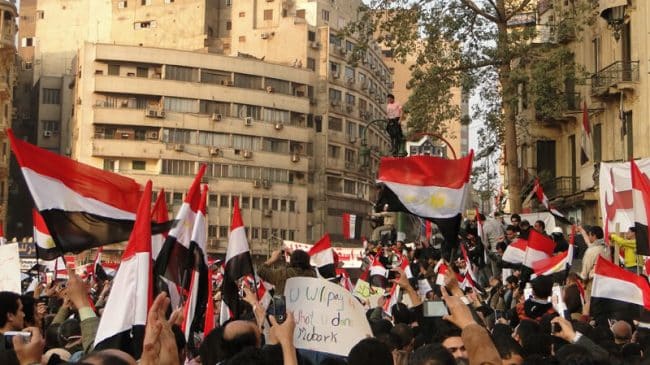The self-immolation of a young Tunisian street vendor Tarek Mohamed Bouazizi helped spark the Arab Spring. The first of many protestors in 2011 sharing the honor of Time magazine Person of the Year, Bouazizi was denied the right to trade, having his produce repeatedly stolen by police while being harassed by corrupt government officials. It is fitting, then, that the circumstances leading up to his tragic protest are also emblematic of underlying causes of the revolution.
Frustration over poor economic conditions and political repression ultimately boiled over into the sweeping protests displayed on television screens around the world. The narrative heard in the U.S. is that the Arab Spring is about democracy. Yet this lack of political representation is merely a symptom of the fundamental lack of economic freedom in Arab countries.
Every index of economic freedom-from The Wall Street Journal and The Heritage Foundation’s index to the Fraser Institute’s index-indicate that nearly all Arab countries in North Africa and the Middle East have high levels of economic repression. This denial of economic liberty resulted in the rampant corruption, runaway inflation, and instability that berthed the Arab Spring.
A number of wide-ranging economic restrictions have damaging consequences for the Arab world. Burdensome governments dominate consumption and investment, replacing individual choices with the politicization and bureaucratization of economic decisions. Property rights are hampered by the lack of an independent justice system. Over-regulation of credit and labor markets obstructs competition, while free trade is limited by restrictions on imports and exports.
The best hope to address this myriad of hindrances to economic freedom focuses on opening up international trade. Trade liberalization will not only promote inter-Arab movement of people, goods, and services, but will also encourage the implementation of wider reforms in favor of economic freedom.
Removing tariff and non-tariff barriers to trade through the creation of a large free trade area between Arab countries will encourage cooperation between national economies, increasing the market size for the productive businesses of each country. Investment opportunities will naturally rise, and costs will fall as firms benefit from economies of scale. The resultant success of private investment, long supplanted by the oppressive public sector, will encourage Arab countries to further engage in reforms conducive to economic freedom.
A free trade area will foster the spread of economic freedom as neighboring countries are allowed to compete for capital and skilled labor. Open borders will stimulate the movement of people and capital as the profit seeking process unfolds, favoring areas that encourage trade and freedom. In order to remain competitive with neighboring economies for valuable tax revenue, each country will be spurred on to undertake deep institutional reforms.
Previous attempts to liberalize trade between Arab countries, such as the Cooperation Council for the Gulf Countries or free trade agreements between Morocco, Jordan, Egypt and Tunisia, should be expanded upon. In the past, the creation of such an Arab free trade zone has been blocked by political considerations. Instead, a “bottom-up” approach must be adopted among businesses and civil societies, pressuring Arab leaders to overcome political and personal divisions by forging networks across national borders.
Such a strategy has repeatedly proved successful. Arab merchants pressured governors to render trade roads safer. British liberals formed the Anti-Corn League that led to the abolition of protectionist laws. Japanese companies, by developing supply chains during the 1960s with subcontractors from South Korea, Taiwan, and Hong Kong, were able to facilitate the emergence of the Association of Southeast Asian Nations.
By building up economic exchanges and strengthening ties between Arab nations, the benefits of trade liberalization will become so evident that politics will be forced to answer to public opinion and satisfy their need for an integrated Arab economic community. This will encourage not only the spread of free market ideas, but facilitate the economic integration of young people by providing sufficient opportunities for investment and jobs. If the people of the Middle East and North Africa are to capitalize on the achievements of the Arab Spring, free trade must be of utmost importance.
Hicham El Moussaoui is an Assistant Professor of Economics at the University of Sultan Moulay Slimane (Morocco) and analyst for www.unmondelibre.org.
